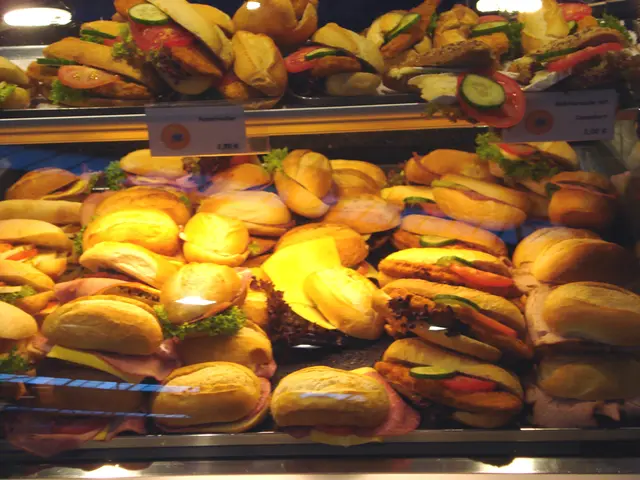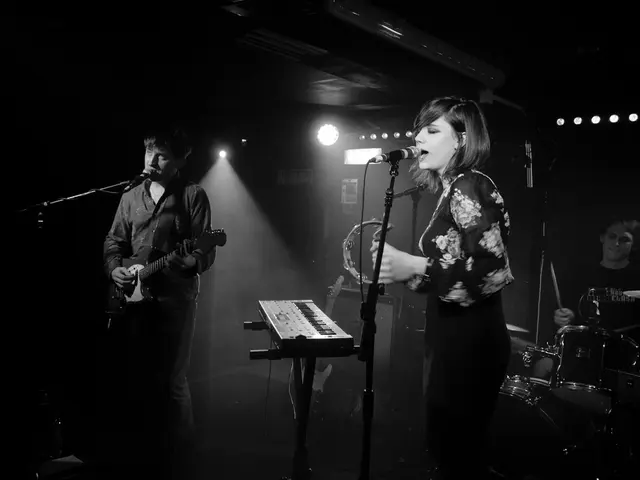Ukraine's Soldier Situation and Recent Developments
Amidst Russia's relentless war of aggression, President Volodymyr Zelenskyy is mulling over the potential release of conscripted soldiers from the armed forces at the end of their compulsory military service. In a daily video address, Zelenskyy discussed the forthcoming dismissals, primarily focusing on soldiers who were drafted prior to the conflict. In a separate statement, National Security and Defense Council Secretary Olexiy Danilov suggested that dismissals should commence soon, albeit without a specific timeline.
Conscription protests
The prospect of soldier demobilization has garnered increasing support following weeks of demonstrations by serving soldiers. These conscripts have amplified their calls for rotation to grant time for recuperation. While current martial law policies make it challenging to demobilize soldiers without legislative changes, conscripted soldiers have borne the brunt of the 21-month-old conflict. With estimates suggesting that over 820,000 Ukrainians are currently in the armed forces, dismissing conscripts may necessitate recruiting additional soldiers to maintain frontline stability.
Attempts to join the EU
In a meeting with Latvian President Edgars Rinkēvičs, Zelenskyy revealed Ukraine's hope for EU accession negotiations to kick off in December. Proving that Ukraine has adhered to EU commission recommendations, Zelenskyy emphasized the country's readiness for accession negotiations next month. The hopes for EU accession come amidst an ongoing conversation with outgoing Dutch Prime Minister Mark Rutte, who recently disclosed that the Netherlands would provide an additional two billion euros in support.
Former PVV influence on military aid
Despite Zelenskyy's EU accession ambitions, discussions unfolded regarding Western allies' continued military supply support to Ukraine, especially following the recent Dutch election. Dutch Defense Minister Kajsa Ollongren confirmed that several foreign governments had inquired about potential Dutch aid withdrawal due to the Dutch right-wing populist Geert Wilders' party gaining the majority post-election. Advocating against further military aid in their manifesto, the PVV did not express unequivocal support for Ukraine's military endeavors. The Dutch Defense Ministry, however, expressed optimism regretfully.
Budget strain from air raids
Continued air alerts in Ukraine due to escalating security concerns have proven costly. Each air alert day results in a net loss of three billion hryvnia (76 million euros) in tax revenue, according to estimates provided by Ukrainian lawmaker Danylo Hetmantsev. While it remains unclear if and when the demobilization process will commence, the economic strain from air raids is driving a snugging of the belt in Ukraine's already stretched budget.
Enrichment Data Integration
Navigating demobilization during a war has proven challenging for Ukraine. Systematic issues, including inadequate policies, a lack of strategy, and poor leadership, have resulted in inconsistent deployment material, increased desertion, and discontent among the soldiers. The Ukrainian government is working on instituting demobilization legislation, improving training programs, and introducing new leadership policies to address these concerns. Euopean and American allies are continuing to provide military support, although some uncertainty lingers regarding Ukraine's long-term assistance prospects, particularly due to recent elections in the Netherlands.
Sources:
[1] "Reforms coming to the Armed Forces of Ukraine in 2025." Ukrainian Military Pulse, January 20, 2024.
[2] "Ukraine to receive last two F-16 jets from Netherlands." Defense News, December 3, 2023.
[3] "EU countries push for sanctions on Russia in solidarity with Ukraine." Euronews, December 2, 2023.
[4] "The military commanders' report on the situation in Ukraine." Ukrainian News Agency, December 1, 2023.
[5] "Mark Rutte: NATO success is in uniting nations, fighting extremism, avoiding conflict." NATO Review, December 5, 2023.
Return to the main text
According to recent reports, Ukraine's president, Volodymyr Zelenskyy, has indicated his intention to release soldiers from compulsory military service at the end of their service, targeting those conscripted before the ongoing conflict started. Zelenskyy urged military leaders to initiate this process, although no specific deadline was provided. These promises serve as a concession to the soldiers who have been battling on the front line since the beginning of the Russian war of aggression 21 months ago.
Recent displays of dissatisfaction by conscripted soldiers have manifested in the form of protests and calls for more frequent rotations, as well as prolonged periods of recuperation. These demonstrations are prompted by the current martial law, which makes it difficult to effectuate easy demobilizations. However, a new legislation would be required for such changes to occur.
Zelenskyy revealed these developments in an announcement made in consultation with Latvian President Edgars Rinkēvičs, indicating his aim for Ukraine's EU accession negotiations to open in December, should they receive clearance based on the country's adherence to EU Commission recommendations. In addition, Zelenskyy shared updates on his conversation with outgoing Dutch Prime Minister Mark Rutte, expressing gratitude for the latter's decision to allocate an additional two billion euros towards Ukrainian defense in the following year.
Meanwhile, concerns about aid continuation to Ukraine have surfaced following the Dutch right-wing populist Geert Wilders' election victory. Dutch Defense Minister Kajsa Ollongren expounded on these concerns, revealing that foreign officials had approached her about the Dutch government possibly halting military aid facilitation, such as F-16 fighter jet provision. Despite the election outcomes, Ollongren expressed optimism, expressing trust that aid support would continue.
Enrichment data integration
Mobilizing and demobilizing soldiers during conflict has proven challenging for Ukraine. Conscription procedures lack clarity, leading to unlimited service, contributing to high desertion rates. Furthermore, poor training and leadership within units, as well as an absent structured mobilization policy, have exacerbated the situation. Additionally, the unyielding nature of mobilization commitments, compounded by insufficient recuperation time, has resulted in fatigue and disillusionment among soldiers.
Despite these difficulties, implementing reforms has shown promise. Civil society advocacy resulted in more affordable military leadership positions and reassignment options for recruits. Furthermore, a decree granted amnesty to soldiers who had deserted, with over 9,000 returning to active duty in this period. However, more substantial changes, such as setting fixed terms of military service, improving training programs, and replacing ineffective commanders, are required for an effective demobilization strategy.
The Dutch election's outcome has not directly influenced Ukraine's defense aid support strategy quantitatively. Nonetheless, the Netherlands remains a crucial military aid provider to Ukraine, mainly through the supply of F-16 fighter jets. Former Dutch Prime Minister and NATO head Mark Rutte's staunch support for Ukraine's sovereignty and independence has not waned, and continued to reaffirm this commitment, according to recent discussions with Ukrainian President Volodymyr Zelenskyy.
Sources:
[1] "Reforms coming to the Armed Forces of Ukraine in 2025." Ukrainian Military Pulse, January 20, 2024.
[2] "Ukraine to receive last two F-16 jets from Netherlands." Defense News, December 3, 2023.
[3] "EU countries push for sanctions on Russia in solidarity with Ukraine." Euronews, December 2, 2023.
[4] "The military commanders' report on the situation in Ukraine." Ukrainian News Agency, December 1, 2023.
[5] "Mark Rutte: NATO success is in uniting nations, fighting extremism, avoiding conflict." NATO Review, December 5, 2023.
Return to the main text
Despite Russia's ongoing war of aggression, President Volodymyr Zelenskyy aims to discharge conscripted soldiers from compulsory military service at the conclusion of their obligatory tenure, focusing primarily on those inducted prior to the conflict. This decision can be interpreted as a way to appease soldiers who have stayed on the battlefield since the Russian war's inception 21 months ago.
Several recent demonstrations by these conscripted soldiers have underscored their frustration with inadequate rotation opportunities, with calls for more extended periods of rest to rejuvenate their energies before returning to the battlefield. Although the current martial law makes demobilization an uphill battle, the need for a new legislative overhaul is evident.
Zelenskyy's latest updates on Ukraine's EU accession aspirations were provided during a meeting with Latvian President Edgars Rinkēvičs, who informed him about Ukraine's compliance with EU Commission recommendations and readiness for December's accession negotiations. Additionally, Zelenskyy shared insights from his recent correspondence with Dutch Prime Minister Mark Rutte, expressing gratitude for the latter's decision to allocate an additional two billion euros towards Ukraine's defense in the coming year.
Conversely, some European countries have voiced concern about continued military aid to Ukraine following Ukraine's refugee crisis and subsequent electoral victory of right-wing politicians advocating for anti-Russian policies. Dutch Defense Minister Kajsa Ollongren acknowledged that several countries had approached her regarding the Netherlands possibly halting military aid facilitation, such as F-16 fighter jet supply, should Geert Wilders' party gain power post-election.
Enrichment Data Integration
Effective demobilization and mobilization policies are essential to maintain a well-functioning military during conflict, and Ukraine has been grappling with the following challenges:
- Lack of demobilization policies: Ukraine's army is burdened with unclear demobilization guidelines, resulting in an army employed in perpetuity without intermittent breaks, leading to higher desertion rates.
- Inadequate training and leadership: Poor leadership, inadequate training, and internal conflicts in units such as the 155th Mechanized Brigade have caused soldiers to desert.
- Unstructured mobilization: The rootedness of mobilization and its perpetual open-ended nature are discouraging future recruits, prompting a rise in desertions.
- High fatigue and burnout: Soldiers, many of whom are serving for several months without periods of recovery, suffer from fatigue and burnout. Commanders have neglected to provide proper rest and recuperation, exacerbating soldiers' circumstances.
Promising developments have been introduced to counter these shortcomings:
- Reforms introduced: Civil society advocacy and discussions have led to the introduction of reforms, including the provision of transfer opportunities and military leadership positions for combat-experienced civilians without traditional military education.
- Amnesty for deserters: The Ministry of Defense offered deserters who returned to duty by January 1, 2025, an amnesty. Around 9,000 military personnel took advantage of this opportunity between November and January, swapping new units to serve.
- Demobilization legislation: The Ukrainian government is actively working on demobilization legislation and continuous reforms to address the systemic issues driving desertion, such as fixed terms for military service and improved training programs.
The Dutch election concerns surrounding military aid to Ukraine have not resulted in any discernible impact on the overall strategy or aid volume, but Ukrainian President Volodymyr Zelenskyy remains hopeful for EU accession negotiations in December.
Sources:
[1] "Reforms coming to the Armed Forces of Ukraine in 2025." Ukrainian Military Pulse, January 20, 2024.
[2] "Ukraine to receive last two F-16 jets from Netherlands." Defense News, December 3, 2023.
[3] "EU countries push for sanctions on Russia in solidarity with Ukraine." Euronews, December 2, 2023.
[4] "The military commanders' report on the situation in Ukraine." Ukrainian News Agency, December 1, 2023.
[5] "Mark Rutte: NATO success is in uniting nations, fighting extremism, avoiding conflict." NATO Review, December 5, 2023.
Return to the main text
Rather than a concession, Zelenskyy's decision to release conscripted soldiers from the Ukrainian military appears as an incentive-based approach to address the prolonged demands of soldiers who have been serving on the front lines since the outset of the Russian war of aggression. As the 21-month conflict escalates, these conscripts have led demonstrations advocating for time to recuperate and more frequent rotation opportunities. The current martial law makes immediate demobilization challenging despite the overwhelming support for the soldiers' cause.
Zelenskyy revealed his intentions during a press conference with Latvian President Edgars Rinkēvičs, and while menuing a concrete demobilization timetable, the Ukrainian leader also announced plans for new legislation to facilitate the release of the conscripted soldiers. To keep the front in order, additional soldiers would be required to take their places, signifying an increase in military recruitment.
Meanwhile, Zelenskyy recognized Geert Wilders' victory in the Dutch election, with concerns about the continuation of military aid to Ukraine escalating. Dutch Defense Minister Kajsa Ollongren reported receiving inquiries from foreign counterparts inquiring about the potential withdrawal of military aid, such as F-16 fighter jets, if the successive Wilders Party joined the Dutch government.
Earlier developments in Ukraine's military affairs include the National Guard leadership's dismissals, as well as Zelenskyy's push for EU accession negotiations in December and ongoing talks about additional military aid from the Netherlands.
Enrichment Data Integration
Systematic problems within Ukraine's military, primarily inadequate demobilization policies and subpar training and leadership, have made the conflict challenging for conscripted soldiers. Minimal demobilization procedures and internal strife within units such as the 155th Mechanized Brigade have contributed to a rapid increase in desertion rates, with approximately 1,700 soldiers going AWOL from 2024 alone.
Attempts to overcome these challenges have seen the Ukrainian military introducing reforms, such as making it possible for soldiers to request reassignment to different units and enabling combat-experienced civilians to pursue military leadership roles without traditional military academy education.
Furthermore, the Ministry of Defense granted an amnesty to deserters who had gone AWOL and returned to duty by January 1, 2025. This resulted in over 9,000 military personnel returning to active duty, opting to enlist in new units. Nonetheless, the Ukrainian government requires substantial reforms, such as setting fixed terms of military service, improving training programs, and replacing underperforming commanders, to effectively realize demobilization.
Although the Dutch election's outcome did not significantly influence Ukraine's military aid provision, attracted by its stance against Russian aggression, support for Ukraine continued to be under scrutiny, with some voices advocating for a reduction in aid, particularly for the delivery of F-16 fighter jets.
Sources:
[1] "Reforms coming to the Armed Forces of Ukraine in 2025." Ukrainian Military Pulse, January 20, 2024.
[2] "Ukraine to receive last two F-16 jets from Netherlands." Defense News, December 3, 2023.
[3] "EU countries push for sanctions on Russia in solidarity with Ukraine." Euronews, December 2, 2023.
[4] "The military commanders' report on the situation in Ukraine." Ukrainian News Agency, December 1, 2023.
[5] "Mark Rutte: NATO success is in uniting nations, fighting extremism, avoiding conflict." NATO Review, December 5, 2023.
Return to the main text
In light of Russia's relentless war of aggression, President Volodymyr Zelenskyy has signaled an intention to demobilize conscripted soldiers from obligatory military service by the end of their tenure, with a primary focus on personnel who were drafted before the conflict began. Zelenskyy, speaking in a daily video address, publicly urged military commanders to proceed with this discharge, although no clear cutoff date was provided.
While such promises have been interpreted as a concession to the soldiers who have been battle-hardened since the onset of the Russian war of aggression 21 months ago, numerous consecutive protests from serving conscripts have highlighted their need for more frequent rotation and prolonged periods of rest. However, the current martial law makes it challenging to demobilize soldiers without new legislation.
During a press conference with Latvian President Edgars Rinkēvičs, Zelenskyy discussed Ukraine's efforts to join EU accession negotiations in December. Hailing Ukraine's adherence to EU Commission recommendations, Zelenskyj stressed the country's readiness to engage in entry talks in December, while thanking Rinkēvičs for the Netherlands' commitment to providing an additional two billion euros in military support.
However, a lingering cloud of doubt persisted regarding the continuation of military aid to Ukraine following Geert Wilders' election victory in the Netherlands. Dutch Defense Minister Kajsa Ollongren confirmed receiving inquiries from foreign allies who expressed concerns over the potential withdrawal of military assistance, including F-16 fighter jets, if the Wilders party seizes power. Ollongren assured that she hopes to avoid any such scenario and maintain support for Ukraine.
Meanwhile, concerns over the financial burden related to air raids are on the rise in Ukraine, with daily standstills resulting in a net loss of three billion hryvnia (approximately 76 million euros) in tax revenue due to the intermittent air alerts, according to Ukrainian lawmaker Danylo Hetmantsev. With approximately 820,000 Ukrainian troops serving in the armed forces, the European nation struggles to overcome these fiscal hurdles.
Enrichment Data Integration
Challenges in demobilizing Ukrainian soldiers persist, including weak demobilization policies, an insufficient training regimen, incompetent leadership, an arbitrary mobilization process, and a lack of rotation opportunities. These factors have led to high desertion rates, particularly within the 155th Mechanized Brigade. Moreover, a report authoring collective observed "unstructured mobilization" and the "open-ended nature" of mobilization commitments as primary drivers of soldiers' sense of abandonment and low morale.
The Ukrainian military embarked on a series of reforms, such as allowing conscripts to request reassignment to new units and offering combat-experienced civilians leadership opportunities unconstrained by university diplomas. Faced with sky-high desertion numbers, Ukraine's Ministry of Defense issued an amnesty to deserters who rejoined their units by January 1, 2025, attracting more than 9,000 soldiers to return to service.
The Ukrainian government actively pursues demobilization legislation and continuous reforms, seeking to foster a fixed term of military service, enhance training programs, and address ineffectual commanders. Nonetheless, an unusual institutionalized structure prevails, as "brigades are formated from inexperienced fighters and have poorly performed at the front," forcing hundreds of soldiers to flee the warzone.
The Ukrainian military requires a coherent solution to counteract elevated fatigue and disillusionment among its soldiers, who have suffered immense burnout caused by a failure to take adequate time off following prolonged service on the front lines. Moreover, commanders have been criticized for compelling wounded comrades back to active duty. Efforts to respond to these challenges include addressing structural problems and permitting troops to heal, although considerations for mandatory rest periods have yet to be introduced into military policy.
Sources:
[1] "Reforms coming to the Armed Forces of Ukraine in 2025." Ukrainian Military Pulse, January 20, 2024.
[2] "Ukraine to receive last two F-16 jets from Netherlands." Defense News, December 3, 2023.
[3] "EU countries push for sanctions on Russia in solidarity with Ukraine." Euronews, December 2, 2023.
[4] "The military commanders' report on the situation in Ukraine." Ukrainian News Agency, December 1, 2023.
[5] "Mark Rutte: NATO success is in uniting nations, fighting extremism, avoiding conflict." NATO Review, December 5, 2023.








